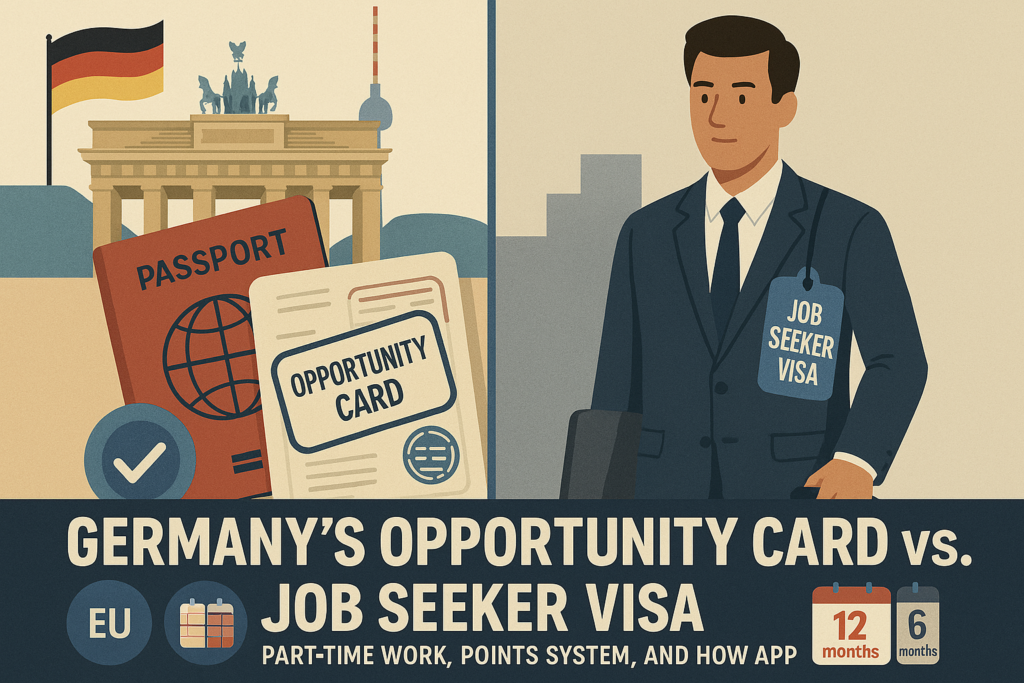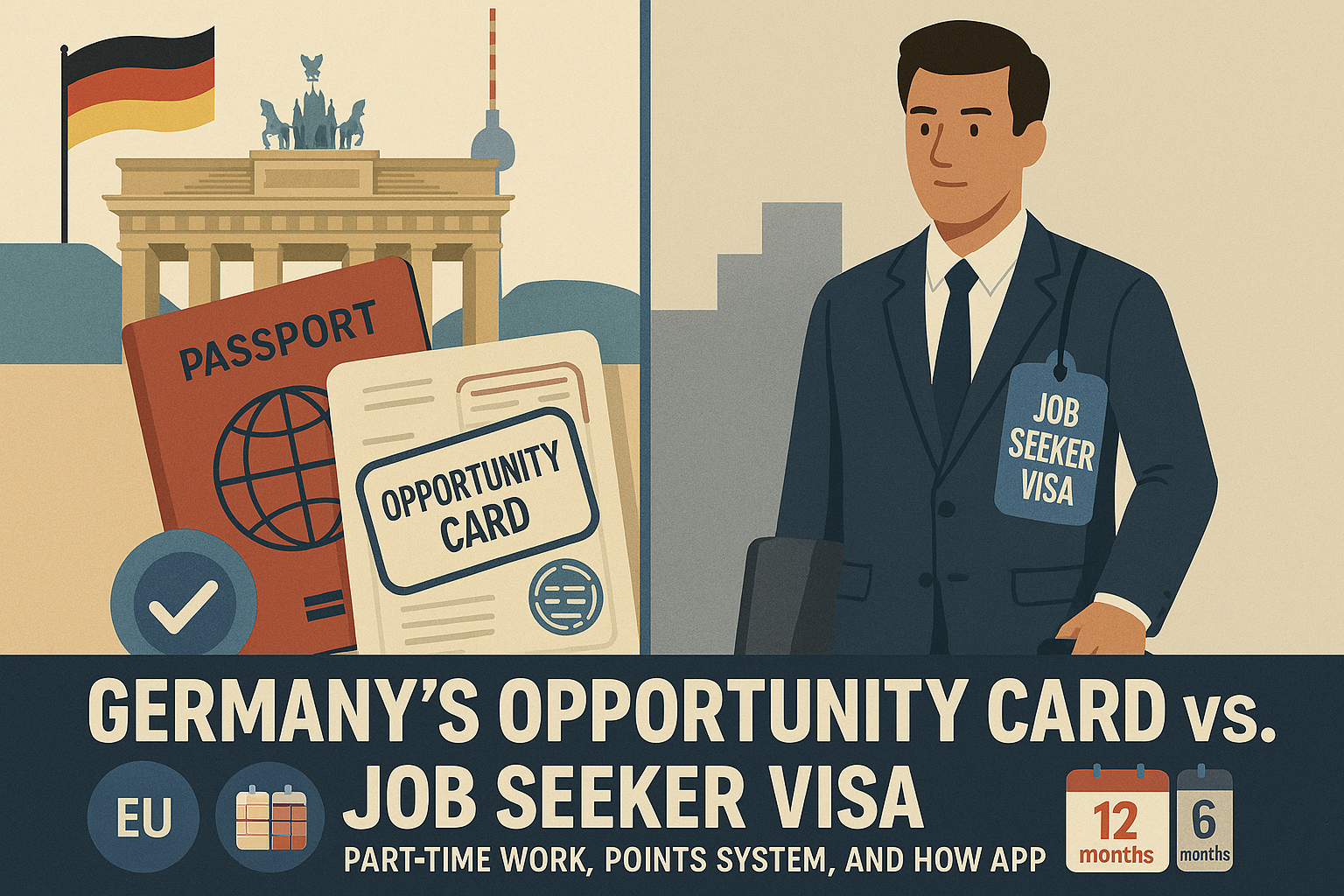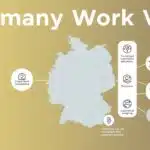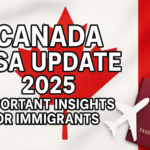Germany, a key player in Europe’s economy, is changing its immigration rules to draw in top talent from around the world. The Job Seeker Visa and the Opportunity Card (Chancenkarte) are two main paths for non-EU professionals. Both allow skilled workers to look for jobs in Germany, but they have different rules and benefits. This article explains their requirements, how to apply, and their advantages, helping you pick the right path for your career.
Table of Contents
1. Overview of the Opportunity Card and Job Seeker Visa
Germany Job Seeker Visa
- Purpose: A 6-month visa for non-EU nationals to explore job opportunities in Germany.
- Key Features:
- No work allowed during the visa period.
- Requires a recognized academic or vocational qualification.
- Applicants must prove financial stability (e.g., a blocked account with €5,604) 26.
Germany Opportunity Card (Chancenkarte)
- Purpose: A 12-month residence permit for skilled workers to search for jobs and work part-time (up to 20 hours/week).
- Key Features:
- Points-based eligibility system (minimum 6 points required).
- Lower language barriers (A1 German or B2 English).
- Requires proof of funds (€1,027/month) and vocational training/degree 34.

2. Eligibility Criteria: A Side-by-Side Comparison
| Factor | Job Seeker Visa | Opportunity Card |
|---|---|---|
| Duration | 6 months | 12 months |
| Work Permission | Not allowed | Part-time work (20 hrs/week) permitted |
| Language Requirements | B1 German (vocational) or none (degree) | A1 German or B2 English |
| Financial Proof | €5,604 (blocked account) | €12,324 (blocked account or part-time income) |
| Qualifications | Recognized degree/vocational training | 2+ years of vocational training or degree |
| Age Limit | None | Preference for applicants under 40 |
| Application Process | Embassy/consulate | Online or embassy |
3. Breaking Down the Opportunity Card’s Points System
To qualify for the Opportunity Card, applicants must score 6+ points across these categories:
- Educational Qualifications:
- Partial recognition of foreign degree: 4 points.
- Qualification in a shortage occupation (e.g., IT, healthcare): 1 point 14.
- Work Experience:
- 2 years in the last 5 years: 2 points.
- 5 years in the last 7 years: 3 points.
- Language Skills:
- German A2: 1 point; B1: 2 points; B2+: 3 points.
- English C1+: 1 point (additional).
- Age:
- Under 35: 2 points; 35–40: 1 point.
- Previous Stays in Germany:
- Legal stay of 6+ months (e.g., study/work): 1 point 14.
4. Step-by-Step Application Processes
- Document Preparation:
- Valid passport, CV, cover letter, proof of qualifications, blocked account statement (€5,604), and health insurance 2.
- Embassy Appointment:
- Submit documents and attend an interview.
- Processing:
- Takes 4–6 weeks; fee: €75 2.
Opportunity Card Application
- Online Eligibility Check:
- Use Germany’s points calculator to confirm eligibility 4.
- Document Submission:
- Passport, proof of vocational training/degree, language certificates, financial proof (€1,027/month), and health insurance 4.
- Apply Online or In-Person:
- Citizens of select countries (e.g., US, UK) can apply after entering Germany 4.
5. Pros and Cons: Which Visa Is Right for You?
Job Seeker Visa
- Pros:
- Simpler application process.
- Ideal for candidates with recognized degrees and savings.
- Cons:
- No income during the 6-month search period.
- Strict recognition requirements for foreign qualifications 58.
Opportunity Card
- Pros:
- Longer stay (1 year) with part-time work rights.
- Flexible points system rewards experience and language skills.
- Cons:
- Complex documentation (e.g., proof of points).
- Competitive due to annual caps 68.
6. Strategic Tips for Success
- For the Job Seeker Visa:
- Start networking with German employers early.
- Look for jobs on LinkedIn and StepStone.
- For the Opportunity Card:
- Boost your points by improving your German skills.
- Focus on jobs in shortage areas like nursing and IT.
7. Real-Life Scenarios
- Case Study 1: Maria, a software engineer from Brazil, used the Opportunity Card. She got a part-time IT job and applied for full-time roles. Her German skills and work experience helped her qualify easily.
- Case Study 2: Ahmed, an Egyptian architect, went for the Job Seeker Visa. He found a job in 4 months by attending architecture fairs in Berlin and using his recognized degree.
8. FAQs
- Can I extend the Opportunity Card?
- No, but you can switch to a work visa or EU Blue Card if you get a job.
- Is German mandatory for the Job Seeker Visa?
- Only for vocational applicants; degree holders don’t need to speak German.
- Which visa has a higher success rate?
- The Opportunity Card is better for long-term prospects because of work rights.
9. Latest Updates (2025)
- The Opportunity Card now accepts English B2 instead of German A1.
- Germany has added AI specialists and renewable energy engineers to its shortage occupation list.
Conclusion
Germany offers two visas: the Opportunity Card and the Job Seeker Visa. The Opportunity Card is for those wanting flexibility and part-time work. The Job Seeker Visa is for those with recognized qualifications and savings. Knowing the differences helps you match your skills with Germany’s job market. For more help, check Germany’s official immigration portals or talk to certified advisors.










